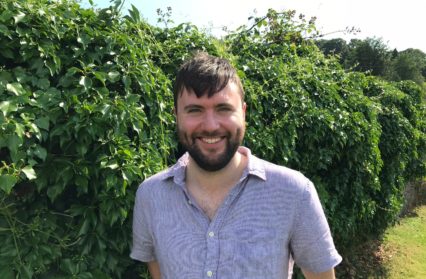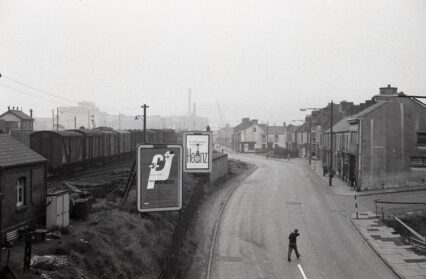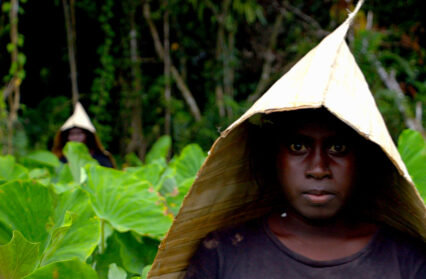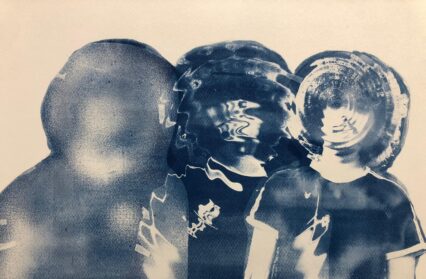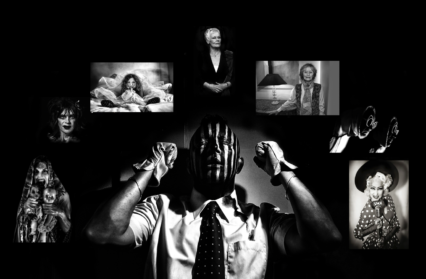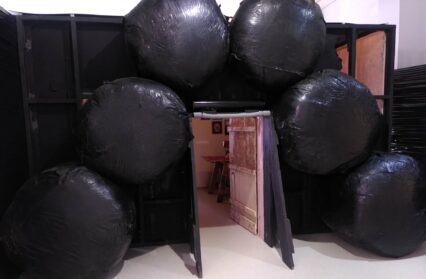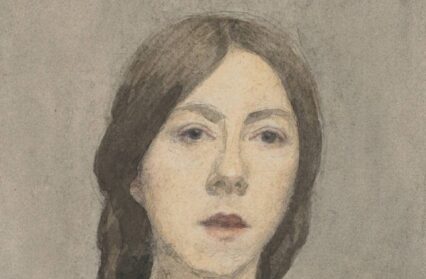Jacob Hodgkinson took an unconventional route to becoming a playwright, but nevertheless has recently celebrated the publication of his play Lung Water as part of Methuen Drama’s ‘Lost Plays’ series. Candy Bedworth caught up with Hodgkinson to discover more about the playwright, the pandemic and the lost performance.
Writers and plagues are nothing new. Boccaccio, Daniel Defoe and Albert Camus gave us their musings on the subject. And of course, Shakespeare lived his whole life under the horrors of the bubonic plague. The London theatres where his plays were performed were often closed, forcing the players into lockdown or leaving to tour provincial towns like Bath and Shrewsbury.
But what is it like to be an emerging playwright and suddenly find yourself locked down in a tiny village in rural Wales, just as your work is about to be performed nationwide? I spoke to Jacob Hodgkinson via zoom to find out.
Candy Bedworth: Your play Lung Water was due to be staged just before lockdown hit; tell us about that.
Jacob Hodgkinson: Lung Water was already with the production company and I was waiting for rehearsals to start. It was going to tour a number of venues in Wales and then do four weeks in London, which was really exciting — but then lockdown happened. There have been some discussions about whether that could be picked up now, and brought back to life — that would be brilliant. But nothing is certain in the current climate, so at the moment it is a lost performance.
Candy Bedworth: But then the publisher Methuen contacted you?
Jacob Hodgkinson: Yes, I’d already signed a contract to have the play published alongside the tour. They print them alongside the production, like a programme. But they decided to publish five plays that didn’t make it to performance: ‘The Lost Plays’. It was my first publication, and I jumped at the chance! It was a really unusual situation, I haven’t really had a professional production, but I’ve had a play published! I feel eternally grateful to Dom O’Hanlon at Methuen Drama for wanting to publish Lung Water. It feels like a little moment of history, we’ll look back at those five pieces together, that didn’t get put on because of the global shutdown of theatre spaces.
Candy Bedworth: You also did a live stream performance of Lung Water.
Jacob Hodgkinson: That was in association with National Theatre Wales, BBC Cymru Wales, BBC Arts and Sherman Theatre. It was a zoom reading, playing online for two weeks. To get an audience, given the situation we were in, was great.
Candy Bedworth: How do you feel about digital performance vs live?
Jacob Hodgkinson: It’s great that we can put on digital performances. A few years ago we couldn’t have done this. It’s hugely important to creatives to continue to make work. But it isn’t the living, communal experience of live theatre — it doesn’t try to be. But I have mixed feelings about it. It was great to see that happen. I was very lucky. But it was an online reading, which is very different to a live theatre performance. Preparing for that, working from a distance over zoom, had a detachment that made me feel less involved. Everyone did a fantastic job, but it felt alien. I’m watching them perform — but I’m in my house. It was harder to engage, even on my own work, with the actors and directors. The buzz of the communal artistic space was missing.
Candy Bedworth: What was your first ever live performance?
Jacob Hodgkinson: Ha, well that was at the Edinburgh Fringe in 2010. The director had dropped out at the last minute. I arrived in Edinburgh and had to view the first performance, re-work it, discuss the performance with the actor, direct it and edit it. To add to this baptism of fire I saw it was running over time so I ended up having to edit live on stage. I’m sat on the side, realising I’m going to have to cut thirty minutes from the play as it’s going on. I’m sitting there, shouting out lines for the actor to skip to. And that was the night The Scotsman newspaper came to do a review! Of course they said it was terrible: the actor didn’t know their lines, someone was shouting from the side of the stage through the whole performance, etc. After that first night it got better and better, but sadly The Scotsman only ever saw that first performance.
Candy Bedworth: What does it feel like when you finish a work and it’s ready to go out into the world?
Jacob Hodgkinson: In a way, a play is always a work in progress. It’s a process, ever developing. In a rehearsal room, it is still getting up on its feet, still in transition. And even during performance we might be re-working it.
I go through periods when I feel I might never write anything again, so when you do get to the stage of having a play complete, there is a sense of achievement — yes I did manage to do that work, yes I feel proud. But then the cycle begins again, and I think, oh maybe that was the last piece I’ll ever write!
I find there are greater gaps now between creating pieces. I’ve learnt so much more about the craft, so as I go into a new piece, I feel I must know what I am doing before I begin, whereas I used to have complete freedom and ran on my intuition. I found I could get lots done quickly. But now I go into it with baggage: learning from the pieces you’ve written before, what worked, what didn’t, how you’ve developed your craft and understanding and so on. As my knowledge of writing grows, so does the pressure from myself. That appreciation of the craft of writing can be a weight. I feel a great pressure that whatever I do has to be better than what I have done before.
Candy Bedworth: Why did you choose to write plays over any other form?
Jacob Hodgkinson: I started writing songs, I suppose that’s how it all began — I was playing in bands as a teenager, writing lyrics. I suppose I didn’t feel I could express everything I wanted to in a song — or certainly not very well, it wasn’t my greatest skill! So I started to use short stories as a way to express myself.
With the short stories, I thought, oh they’re not very good, but the dialogue is okay. I was told I had a natural ear for dialogue, and that was certainly where I felt more creatively free, so plays were an obvious choice. I think I am better with my ear than my eye. You go where you are taken creatively I suppose. I find it very easy to tell stories through people communicating. To be honest, it felt like it wasn’t even a choice, but that the choice had been made for me.
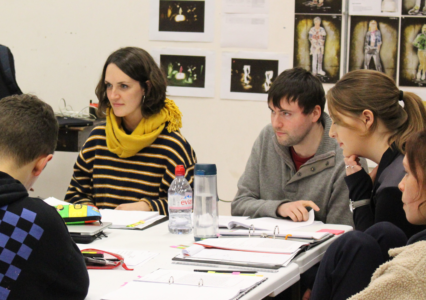
Candy Bedworth: So are you an eavesdropper?
Jacob Hodgkinson: I suppose I must be, but to be honest I spend a lot of my time outside with headphones on! I very much listen to my own thoughts and internal dialogue. When I’ve decided what I want to do, those characters are very clear to me in my head. I know exactly what they are saying.
Candy Bedworth: I recently heard the writer Elizabeth Strout say that once created, her characters live alongside her, almost forever. Is that true for you?
Jacob Hodgkinson: No, they are frozen in that one moment, and the events are happening to them on loop. Essentially I have trapped them in a box which is probably a terrible way of looking at it — what an evil guy! For me, maybe that was the only moment I was allowed into that situation, and into their lives.
Candy Bedworth: Are you part of an ‘arts scene’?
Jacob Hodgkinson: I’m not and sometimes that can feel even more lonely than it is as a writer anyway. I find it very difficult to situate myself within an arts scene. That might come from the fact that I left school so early [Hodgkinson left school mid GCSEs]. That might be because I never went to University. It might just be that I’m very bad at getting on with people! I’m quite remote in how I live and work. I spend a lot of time on my own, full stop.
Candy Bedworth: So you’re not a luvvie then?
Jacob Hodgkinson: I’m terrible at networking. It’s the one skill that I wish I had. I know some playwrights are brilliant at it. It really helps if you can communicate about your work, and talk to the right people. I feel a constant crippling anxiety speaking to anyone who is in a position of power. And even if I feel I did well in a meeting, I leave going over and over everything I said, every movement I made, thinking I’m a terrible fool. Then I go into my shell and decide I’m not going to do that again. So I shut the door on myself, even before they do.
Candy Bedworth: Can you make a living from your craft?
Jacob Hodgkinson: Not yet! You always hope that the work is able to sustain you. The last couple of years I didn’t feel far off it. And I was fortunate to make money from my work in lockdown. But now? Definitely not. I need more work, it’s as simple as that. If you want to make money, don’t be a playwright. But I wouldn’t want to put any young playwrights off — I do it because I really love it, and I have a passion for live performance.
I haven’t had the success I would have hoped for. I just lost my agent, who has retired. It’s been a real body blow personally as we had a good relationship. Their feedback on drafts is the thing I miss the most. And I’m rubbish at contracts, so if they do come in, I need someone to do that for me. I’ve lost that sense that there is someone in the industry who believes in me more than anything, that’s really difficult to come to terms with.
Candy Bedworth: How do you feel about support for playwrights?
Jacob Hodgkinson: The New Welsh Playwrights programme was fantastic for me and I loved every minute. It was an intense learning period and I was kind of bereft after we finished. Brad Birch is an amazing tutor with a wealth of knowledge. I found him really relatable — we’re roughly the same age, and we both spent time with the Royal Court group. He’s intelligent but also incredibly kind.
And theatres are cultivating new playwrights. There are a number of great courses, groups and facilities, some are online. But the next stage of getting a personal relationship with a director or theatre is down to the individual playwright. Then it becomes more of a lottery.
Sherman Theatre have recently announced the creation of a new literary department ‘to drive the development of writers across Wales’, which is brilliant. Joe Murphy was keen to get this going from the moment he walked through the door. It’s a fantastic facility, knowing there is somewhere to send your writing — we’ve needed this for a long time, it is great for Wales and for Welsh writers.
Candy Bedworth: What about other playwrights? Who do you rate?
Jacob Hodgkinson: I always keep an eye on what is in vogue, what looks exciting, what is getting good reviews. Alice Birch, Lucy Kirkwood and Brandon Jenkins are inspirational. I have enjoyed reading their scripts over lockdown.
The last great live performance I saw was Wolfie by Ross Willis. I didn’t know his work before — it was exciting. But I haven’t seen a live show for almost two years. I love David Ireland’s work, I saw Sadie on the BBC — it was phenomenal. Then I went on to read his Can’t Forget About You — delving into other playwrights’ back catalogues and developing my knowledge of their work has been a highlight of lockdown.
Candy Bedworth: I felt Lung Water had a very filmic quality — it would translate beautifully to the screen. Would you like to write for film or TV?
Jacob Hodgkinson: I love film, and I would love to write for TV! Sadly my idea pitches have gone badly. Maybe I need to learn how to pitch? Theatre is not like writing for films or TV. It’s a very different medium. The scope of TV is exciting, but scary. How do I expand my idea out to six hours of TV as opposed to seventy minutes on stage? That’s what I’m learning now. I have been writing plays for so long that it’s easy for me to think of an idea in the accepted theatrical running times. I think of an idea and I instantly know, oh that’s seventy minutes, that other one is an hour. The idea of creating say six hours of TV? I just think, ah no, I could do that in an hour and a half. It’s a skill I really want to develop, and working in a more visual craft would be exciting.
Candy Bedworth: On Twitter you said, ‘I sit down to write and mostly it is horrific pain’.
Jacob Hodgkinson: I think I have a difficult relationship with reality. I realised everything I do is to escape reality. That’s why I love the creative arts — listening to music, watching films, going to the theatre, reading books, all of it is escapism.
When I sit down to write and think, I’m still here, and it’s painful. The best thing is when I’m not consciously thinking, I don’t feel like I’m forcing anything, it just happens, I’m outside of myself. All I hear is the characters in my head. I love that. That is why I write, to be lost inside the stories I love. Some days that doesn’t happen at all, and it’s painful.
I see some writers say, ‘Oh it’s such a joy to go to my desk and write’. I never feel that. I feel great when I’ve done a good day’s work. But I have to start all over again the next day! It’s like running — being in pain going up that hill, before you hit the state of euphoria. But no, I never sit down and think, hey, this is going to be joyous!
Candy Bedworth: How do you work?
Jacob Hodgkinson: Every piece has its own path. It emerges as I go along. I have no set way of making a play. I have written from a fleeting image or a feeling. I have written commissions with a specific number of players or a specific story arc. Sometimes it might be sitting down and starting with nothing. It can come from anywhere, you’re just waiting. That is the hardest thing about lockdown — the stimulus of getting out into the world has gone. Seeing the same news, sat at home, watching the world through a screen, feels stilted and isolating. It has been difficult to feel creative and be creative.
I am disciplined — I work Monday to Friday 2pm to 8pm. Generally I edit after midnight, which can cause me a problem when I suddenly raise my head and I’ve been editing for five hours! But I love it when it’s dark and nobody is around — there is such a feeling of being away from the world. I’ve always been that way. I feel more in control of everything when everyone else is in bed!
I have written pieces with a specific space, or audience, or theme, in mind. I went through a period of writing plays expressing just one feeling. And I often think of my plays in terms of colours — this is my blue play, my red play, my yellow play.
Candy Bedworth: The lonely collaborator?
Jacob Hodgkinson: Theatre is a wonderfully collaborative process. I write the script, then work with a director and we continue to develop that together. I actively seek to work with directors whose work I respect. You can develop a relationship where you communicate in a kind of shorthand. We go into rehearsals, and at this point the director has brought in their creative team — sound, lighting, costume, casting etc. The casting is usually in discussion with the writer, director and producer. That first week of rehearsals can be spent ironing out dialogue with the cast and the director. After that it should be the director’s vision. It is their element then, bringing out the best in your work, their vision of the world you created. A lot of trust is involved.
Candy Bedworth: From the solitary playwright working at home alone, to a busy rehearsal studio — is it a jump?
Jacob Hodgkinson: That first week in the room is exciting — you do it for that buzz. That’s what is different about writing a novel or short story. You do a script to be in a room with people, creating something new, bringing it off the page into life. It’s all for that moment — it’s magical. You chip away at that script until it’s the best it can be. You are building bonds with people who get what you are doing, and who make you, and your work, better.
I love it when my work is up on stage. That is the point when everything has come together: the stage is set, the actors are fantastic, the director has done more than I could possibly imagine. I love seeing what these brilliantly talented people bring to my work. I see it in black and white and they add the colour. I do believe in myself and in my work, but the creation on stage is the magic that makes it all worth it. Theatre should be fun. I always wanted to work in this industry. I want to have fun.
Candy Bedworth: What are you working on right now?
Jacob Hodgkinson: I have two new full-length plays. One of them has involved working alongside a director from the outset — that is different for me, I have loved being challenged on the journey of creation. And you are learning all the time, when you work in a different way.
Candy Bedworth: Where next?
Jacob Hodgkinson: Where will I go with them? I don’t know yet. I think they could be really good. The theatre landscape is quite misty at the moment, but I do believe in my work. You have to be constantly moving forward, hoping that people get to see it. It feels very uncertain as an emerging playwright, coming out of lockdown, we’ll see.
Candy Bedworth: And finally, what are your hopes and fears for theatre now?
Jacob Hodgkinson: Personally, lockdown acted as a brake on my career. My greatest worry is has this set me back two or three years? The whole landscape of theatre could change. What are people looking for now, what will they want to produce and commission? Are people looking for really hopeful pieces of work now? I wouldn’t say my work was massively hopeful! Yes I write pieces that are entertainment first and foremost, but the work must reflect the truths of how we feel at the moment.
But for theatre as a whole? I think absolutely we will be seeing things back on stage. I’m optimistic – theatre has survived thousands and thousands of years right?
Lung Water by Jacob Hodgkinson is available now from Bloomsbury.
Jacob Hodgkinson was born in Nottingham and now lives in mid Wales. Hodgkinson is Associate Playwright for Chippy Lane Productions.
Candy Bedworth is a regular contributor to Wales Arts Review.


